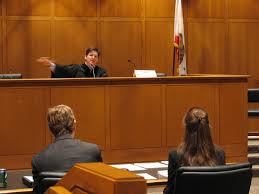Part 6 – Ex Parte Orders
This article series has covered a wide variety of case studies that we review at Attorney Ethics and Professional Liability CLE seminars. Case study topics include everything from potential conflicts of interest to threat of criminal prosecution. Part 6 is a follow-up to the ex parte communication example, but now one attorney is seeking specific relief from the court through an ex parte hearing.
The availability of ex parte orders is limited to several practice areas, and they are most frequently seen in family violence or emergency child custody situations. Based on my experience defending lawyers in similar situations, here’s an example of how not to do it:
Case Study #6 – Does lawyer’s duty to the client trump duty to the court?
 A Lawyer, representing a child’s father in a child custody dispute, files an emergency writ of habeas corpus. At the hearing, the other parent and attorney are not present. The judge asks a series of detailed questions before signing the ex parte order. The lawyer provides only the facts favorable to his client, not all the facts. The judge signs the order, and the father secures custody of the child. The other parent later complains to the judge, and the judge determines that important facts were not shared during the ex parte hearing. In fact, had the judge known all the facts she would not have signed the order. The judge reverses the order and complains to the State Bar.
A Lawyer, representing a child’s father in a child custody dispute, files an emergency writ of habeas corpus. At the hearing, the other parent and attorney are not present. The judge asks a series of detailed questions before signing the ex parte order. The lawyer provides only the facts favorable to his client, not all the facts. The judge signs the order, and the father secures custody of the child. The other parent later complains to the judge, and the judge determines that important facts were not shared during the ex parte hearing. In fact, had the judge known all the facts she would not have signed the order. The judge reverses the order and complains to the State Bar.
What facts need to be disclosed in an ex parte hearing so the judge can make an informed decision? Does the lawyer’s duty to the client trump his duty to the court? What if the client asked the attorney to omit some facts?
Here is what the Georgia Bar Rules say
This example is a breach of GA Bar Rule 3.3 Candor Toward the Tribunal. Ex parte communications require very special circumstances, so less experienced attorneys may not understand or fully appreciate how to approach them. You weigh your options. The other side is not there. Maybe they have been misstating information and blowing things out of proportion. Why tell their story? Where does your duty lie – to the client or the court?
Your obligation to the court is to tell all the facts, not just the facts favorable to your client. When in doubt, disclose everything. The ffective administration of justice is the priority. If a client asks you to omit facts, you are obligated to tell the client that you must disclose all facts or be in violation of, among other potential Rules, GA Bar Rule 8.4 Misconduct. If the client insists on the omission of facts that should be disclosed to the court, you may have to withdraw from representation.
Attorney trouble with a capital T
Since a judge reported the issue, the State Bar will most likely give the complaint a higher weight and more scrutiny. If the lawyer simply overlooked details, or didn’t know about those details at the time of the ex parte hearing, he will probably receive little to no discipline. If the Bar determines that the lawyer knowingly withheld material facts, the penalty could be as severe as disbarment. Full disclosure to the court is the safest way to go. Why risk discipline and your reputation before the court, the State Bar and your colleagues?
If you can’t make it to a seminar, please join my LinkedIn group and participate in the online discussion – Attorney Ethics and Professional Liability.
Douglas Chandler

